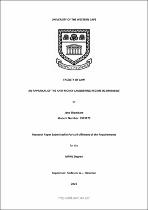| dc.description.abstract | Annually, money laundering costs global financial markets $2.5 trillion. Money laundering is especially problematic in that it results in a plethora of socioeconomic problems including poor economic performance and an upsurge in crime. In fact, predicate crimes such as corruption, drug trafficking, tax evasion, smuggling, fraud, and terrorism are so embedded within money laundering so much so that combatting either is a complicated task. Although it is a daunting endeavour, best practice teaches that multilateral and international cooperation are most effective at fighting money laundering. For that reason, establishing locally sensitive and yet internationally focussed anti-money laundering regimes is a priority for numerous countries. | en_US |

